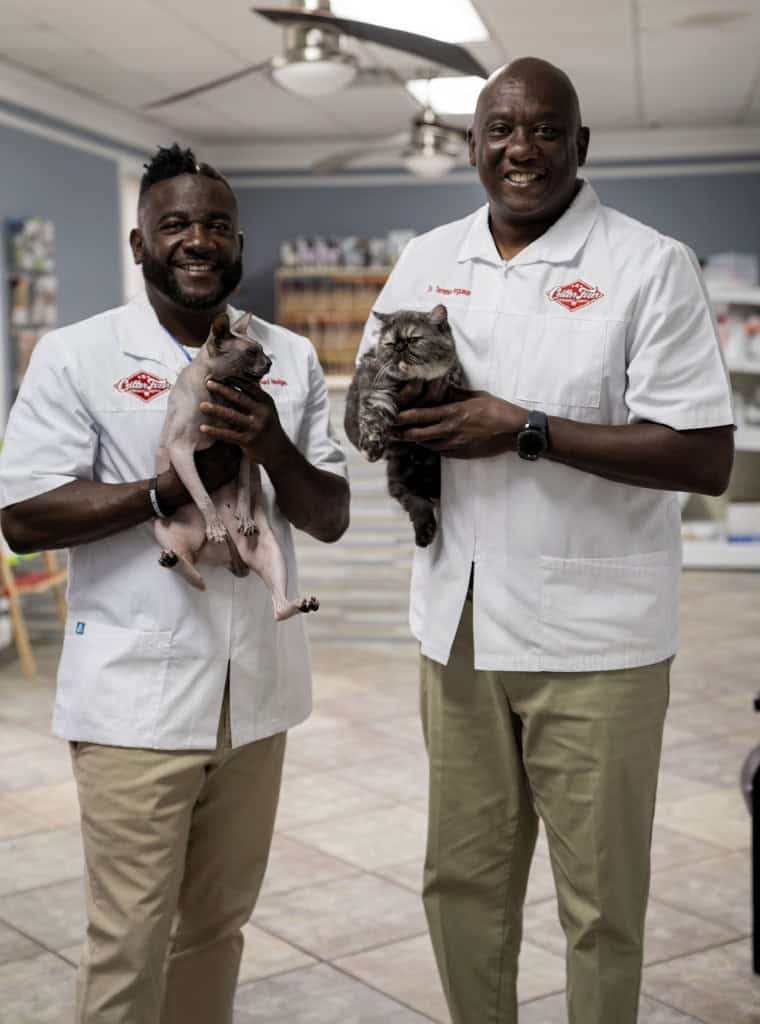By Jeff Pfeiffer
Vetsgiving, Nat Geo Wild’s annual Thanksgiving week celebration of its popular veterinary reality shows, returns this year, beginning Monday, Nov. 22. Each night, feast on several-hour helpings of Critter Fixers: Country Vets (Monday), Heartland Docs, DVM (Tuesday), Dr. K’s Exotic Animal ER and Hatcher Family Dairy (Wednesday), The Incredible Dr. Pol (Thursday), Dr. Oakley, Yukon Vet (Friday & Saturday) and Vets on the Beach (next Sunday, Nov. 28).
Along with featuring cute and/or unique animals, these series have also made celebrities out of the passionate animal caregivers who lead them. Two who have become especially popular just since their series’ debut early in 2020 are Drs. Vernard Hodges and Terrence Ferguson of Critter Fixers, lifelong friends who own and operate a veterinary hospital 100 miles south of Atlanta, in a rural area of Georgia. Both vets say they developed their passion for helping animals at an early age, and are glad they now are able to do that while also potentially inspiring future veterinarians.
“I wanted to be a veterinarian since I was 7 or 8 years old,” Ferguson says. “I’m from a very rural area, [and] we had a dog that was hit by a car. To make it short, I adopted this animal back to health, [or] so I thought I did. Now, looking back on it, it really [just] had a scratch, and I thought I had done something miraculous.
“But that lit a fire in me to want to become a veterinarian, and I’ve always wanted to be a veterinarian since an early age. But it wasn’t until I was a junior in undergrad that I saw the first Black veterinarian, a veterinarian that looked like me. So there came a time where I kind of lost a little vigor until I met this young man who inspired me to continue on the track that I am on, and I’m a veterinarian today.”
Hodges says that, “I always had a dream of being the first Black Jacques Cousteau. I was a fisheries biology major, so I thought I really wanted to study fish and do aquaculture. And I kind of went down that pathway. But growing up in a really rural town, I would do the same thing as Terrence, kind of adopt the local dogs and go out and meet with the cattlemen.
“As I was getting to vet school, I was kind of looking at whether I wanted to apply to a fisheries biology PhD program or veterinary — [and] veterinary medicine won out. I wanted to work with everything. I’m fortunate now that I’m able to work with fish and cows and gerbils and snakes and rabbits and camels, and all these different things.”
Like Ferguson, Hodges takes his potential impact on aiding in the diversification of professionals in veterinary medicine seriously.
“Diversity is definitely a big thing,” Hodges says. “We didn’t see Black veterinarians until we were in college. … We watched Dr. Pol [and] Dr. Oakley and these other guys, [and] they gave us aspirations. Now that some of the Black kids see us, hopefully we’re able to inspire more and keep it going.”
Later on Thursday evening during Vetsgiving, you can also enjoy a sneak peek at Nat Geo Wild’s newest vet series — Pop Goes the Vet With Dr. Joya, which will formally premiere in spring 2022. This show follows Kentucky-based Dr. Joya Griffin, who is one of three African American boarded veterinary dermatologists in the country (as of the time she spoke about her show this past August) and seems poised to become Nat Geo Wild’s latest veterinary star. From impacted earwax to oozing cysts to massive hair loss, there’s no case too mysterious or bizarre for her as Dr. Griffin investigates the largest organ in an animal’s body — the skin.
“One thing I hear over and over again [from] my pet moms and dads is, ‘I didn’t even know a [pet] dermatologist existed,’” Griffin says, explaining the genesis of her series. “And so part of me was wanting to tell that story, that we are out there and that 50% of the cases that a general practitioner will see have to do with the ears and the skin. And when they get a little complicated, I’m here to help and solve those major skin and ear issues. So we’re sometimes not known about, and I’m happy to tell our story.”
Griffin admits that, at first, even she “didn’t know dermatology was a [veterinary] specialty until I had my own pet [a dog named Gizmo] and it needed to see a dermatologist. So when I went to vet school, I took her with me. The first appointment I made was with the dermatology service, and I saw this huge transformation from this sticky, stinky dog that had a poor quality of life and lived in an E-collar, to a dog that was having a full, happy life and looked amazing again.
“I was inspired by that, but I didn’t know how much of a minority I would be in that field. I mean, already you know as a vet student that you’re probably going to be one of few, so I knew that. And I actually didn’t have any African American mentors when I was going through my residency training. But I now have a Black resident, and I think it’s very important. He’s a man; he will be the first African American male who will be boarded soon, hopefully, as a dermatologist. And that’s very important for me to be able to bring someone up behind me, because I didn’t have that same mentorship.”

